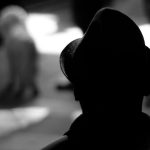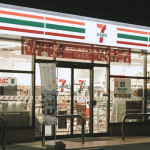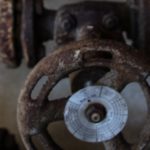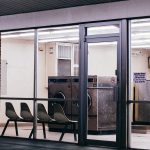Dust is free to dance along these streets, leaping up at the wind’s advances. Leaves follow, skittering and scratching like some music band, then empty plastic bags roll along the gutters, sighing as they bring up the rear. Old newspapers and junk mail flop on the pavements, waving at this passing parade. It’s a daily festival for ghosts.
We found the town by accident: wrong turn some way back. The sign leading in welcomes us to Valerie: population 975. Someone’s tried to scratch away the numbers, so only the five is now obvious under the beige dust coating it.
The sign’s still wrong. After a thoughtful pause, my younger brother wets his fingertip and in the dust swirls a zero. Behind us, Mum sighs sadly, but Dad lets out a huff of a laugh before inviting us to follow, to explore. Mum warns of dogs, of worse; Dad shrugs, but compromises, suggests we drive through, slow, so we can see this ghost town proper. It’s a nice distraction from just the four of us in the car…something our eyes and minds can dwell on, rather than the ghost haunting the growing distance between us.
Dad’s gripping the wheel, squeezing and twisting, even though he’s smiling, eyes shining as he takes it in. Mum’s resting her chin on the back of her hand as she looks out the window, but in the side mirror, I can see that her eyes are fixed on a year ago: May 12th, to be precise. Rob is playing along, pointing out the obvious. His hand can’t be so humoured, though, and sneaks out across the backseat to tap a thigh that’ll never be there again.
It’s almost too much for me, sitting there, invading the carcass of a town that must have been so vibrant. I see windows, the glass gone, like puncture wounds; doors hanging off hinges like flaps of dead skin. Lacerations made as people bled out. Homes left like husks, desiccated shells under dust, dead weeds and foreclosure signs. There’s a grinding sadness to its decay.
Judging by the rusted cars abandoned in driveways, it died somewhere in the early to mid-seventies, and Dad talks about a recession in these parts, a stagflation, but all I understand is that poor got poorer and this place starved. He points out the signs, the clues to the tragedy, content behind the wheel, part of this but distant: a tourist.
Deeper in and homes give way to shops. Signs, pale and peeling, adorn almost every surface: ‘Sale!’, ‘Closing Down!’, ‘Everything Must Go!’, ‘Last Chance!’. I hear my mother’s soft whimper; her eyes are wide and too bright in the mirror. We haven’t really spoken about Marie. Just the usual words of woe and anger and pain, I guess, but right now, I know what she’s thinking. I can’t define it—maybe I’m still too tender, too angry—but this town mirrors it.
She would’ve turned eighteen in a few days. But like this town, Marie wanted to be somewhere else, prove something, making it on her own on the promises of being so much more. Her dreams were glorious; her written note left on the kitchen table had said so. She’d even told us not to worry. I’d never seen Mum so quietly angry before, but her knuckles had turned white round that crushed note. I didn’t understand then why, but now, looking at the crumbling facades and dust dancing along the streets, I think I get it. How could Mum not worry when something like this could happen? This emptying, this lonely, pointless death that could have been avoided if a chance had been given. In the car, I feel anger burn up my throat. How could she have thought we shouldn’t or wouldn’t have worried?!
This town was selfish setting itself up so far from anywhere else, so distant from others. It doomed itself on promises of its own success. And when belief wasn’t enough, and it had no more dreams to eat, it put itself up for sale. Sold itself bit by bit to keep one more store open, keep people coming in off the distant highway. This land of sale, too lost to be brought, too far away to be saved, bleeding out from open wound broken windows and dry skin doors that couldn’t be stitched closed, still bargaining for one more day of trade. Just to die and get buried under dust!
In the mirror, I see Mum’s lips tighten and her chin dimple as she holds back her tears. My throat tightens. Dad is still cataloguing markers to not seeing what’s in front of him; my brother’s hand still tries to tap a thigh that isn’t there, but I am somewhere so different now as we approach the city limits again. Hot tears drip down my cheeks, and I catch my mother’s eye in the mirror. She smiles, soft and sad, as we meet on the common ground that is Valerie. I reach past the headrest and she holds my arms as I hold her.
This is a ghost town, and we should leave ours here in Valerie. She is not our fault; but we can mourn the loss of her glory, suffer the sadness of her passing, feeling blessed that we had the chance to find her in the dust. There is a road leading away from Valerie, and we find hope in that.
…
Biography
Sian Brighal currently lives in Germany with her family and is using the break in teaching to delve into flash fiction writing. She can be found on twitter under @sian_ink.
Image: unsplash.com





